Culinary Arts
Culinary Arts Degree Fundamentals
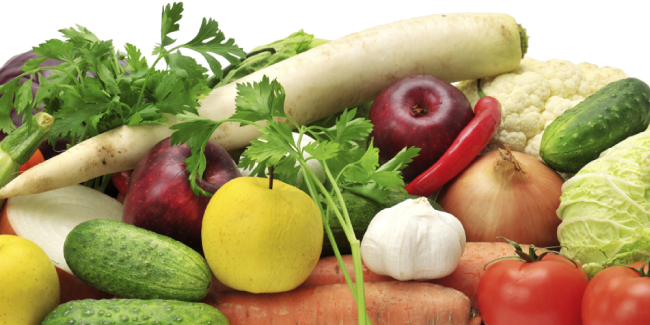
Year One Overview
The Freshman year curriculum is designed to give the student a thorough understanding of the fundamentals of cooking:
- Essentials for Success
-
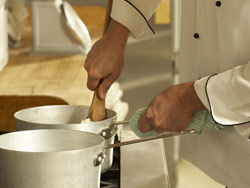
Learn the recipes for success as you transition into your new role of student culinarian and prepare for your career in the foodservice industry.
- Introduction to the Food Service Industry: History and present environment of the food service industry; components of taste and flavor
- Student Success: Time management, study and research skills, technology utilization, and teamwork
- Professional Development: Goal setting, self branding, portfolio and resume writing
- Culinary Skills
-
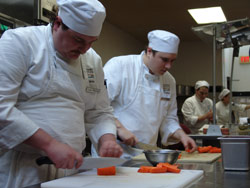
Welcome to the kitchen! This course serves as an introduction to the basic principles of cooking and kitchen organization.
- Knife Skills
- Mise en place; kitchen safety and sanitation
- Stocks: Vegetable, brown and white stocks
- Thickening and binding agents
- Culinary Techniques
-
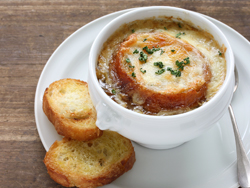
Great soups and sauces are essential on any menu! In this class, you will spend time learning the fundamentals of moist heat cooking methods.
- Soups: Purees, cream, broth, chowder and consommé
- Classic sauces and their derivatives
- Contemporary sauces
- Culinary Fundamentals
-
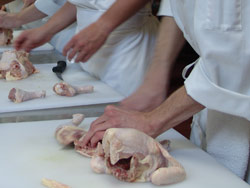
In this course, you can build upon the skills already learned and are introduced to cooking techniques that can be applied across any type of cuisine. Watch the Course Preview Video.
- Introduction to dry heat and combination cooking methods
- Braising, stewing, deep and shallow frying, and steaming
- Vegetable and starch cookery
- Pantry Kitchen
-
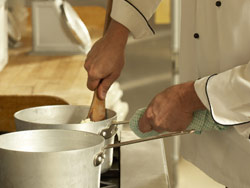
Delicious food can be healthy too! Explore how you can adjust recipes and menus to meet dietary guidelines, while keeping the flavor. View the Pantry Video Here
- Healthy cooking and recipe modification
- Breakfast and lunch cookery
- Food Science: Emulsification, heat transfer, and protein coagulation
- Roasting, grilling and poaching
- Pasta and grain cookery
- Contemporary sauces and dressings
- Culinary Nutrition
-
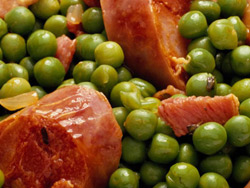
Learn the basic principles of nutrition and how to accommodate specialty diets, lifestyles, and healthy food items.
- Focus on the USDA Food Guide Pyramid and nutrients: fats, proteins, carbohydrates, vitamins, minerals and water
- Recipe modification with regard to certain diets and allergies
- Nutritionally sound lifestyles, weight management, exercise and current issues in nutrition
- Introduction to A La Carte
-
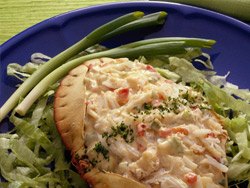
While focusing on the proper preparation of various seafood products, you can learn the importance of teamwork in an A la Carte kitchen.
- A La Minute cooking methods
- Fish and seafood identification and fabrication
- Preparation of fish, shellfish, and bivalves
- Development of flavors
- Plate presentation
- Baking and Pastry Fundamentals
-
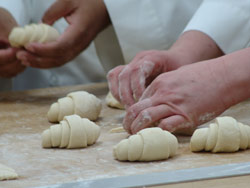
The science of baking is introduced as you prepare breads, pastries, and desserts utilizing fundamental production methods.
- Understanding ingredients and use of bakeshop equipment
- Weights and measures
- Quick breads, muffins, scones, biscuits, and cookies
- Basic yeasted breads: soft rolls, Campagne and Ortiz
- Pies, cobblers, and crisps
- Laminated doughs and classic French pastries
- Meat Selection and Utilization
-
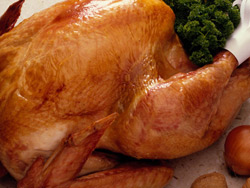
This class provides students a hands-on introduction to the fundamentals of butchery!
- Butchering of primal and sub primal cuts of meat
- Poultry butchery
- Basic charcuterie
- Sausage making and meat preservation
- Product specification, receiving and storing